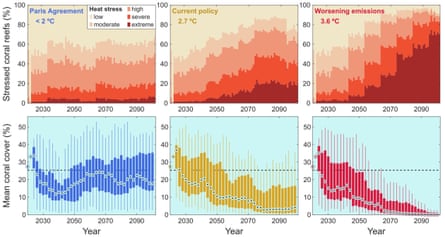The Great Barrier Reef will undergo “rapid coral decline” until 2050 but could recover if global heating is kept below 2C, according to the most detailed modelling so far of the future of the world’s biggest coral reef.
The finding contradicts a widely held view that the decline of the oceanic gem would become irreversible as global temperatures rise above 1.5C, with one report last month suggesting the world’s tropical corals had already reached a tipping point of long-term decline.
But the scientists warned the latest research showed the reef’s natural abilities to mitigate some rises in temperature would be swamped as global temperatures reach 2C.
Current policies around the world to tackle rising greenhouse gas emissions, caused mostly by burning fossil fuels, has the planet on track for about 2.8C of global warming by the end of this century, a UN report said this week.
“If we stay on the pathway we’re treading, it’s a very bad and grim future for corals,” said Prof Peter Mumby, one of the lead authors of the research at the University of Queensland. “It won’t lead to the extinction of corals, but it will be an incredibly profound loss.”
The UN’s climate panel has previously reported that at 1.5C of warming, coral reefs would decline by between 70% and 90%, and at 2C would be almost completely lost.
Coral reefs are one of the most susceptible ecosystems to global heating. Worsening marine heatwaves cause corals to expel the algae that gives them their colour and much of their nutrients – a process known as coral bleaching that can weaken or kill corals. Mass bleaching events, once unheard of, have become increasingly common on the reef.
Mumby said projections about the reef’s future have previously concentrated on the impact of heat without considering ways some corals and reefs can adapt to temperatures.
The research, published in the journal Nature Communications, took into account how some corals – even those of the same species – can tolerate higher temperatures than others, and how those traits can be passed on to their offspring.
The modelling simulated the “eco-evolutionary dynamics” of each of the Great Barrier Reef’s 3,800 individual reefs, including how reefs seed their neighbours with coral babies and how some were in naturally cooler places – known as “climate refugia”.
Dr Yves-Marie Bozec, lead author of the research at UQ, said: “We ran all of those factors with the most up-to-date climate projections – and the news was not good.”
As global temperatures rise to 1.5C the study shows these natural abilities can’t keep up and the amount of coral on the Great Barrier Reef roughly halves by 2040.

Mumby said by mid-century “there will still be places that look like reefs do today, but they will be few and far between”.
The modelling found if global temperature was kept below 2C then reefs slowly recover their coral almost to levels seen in the recent past.
Mumby said reefs in naturally cooler areas or those that could be seeded from nearby reefs all fared better. This showed, he said, that concentrating conservation efforts in those places could reap rewards.
after newsletter promotion
If emissions continue on levels similar to today then by the end of this century coral cover across the reefs would on average be at just 4%.
“Curbing emissions has to remain our number-one priority,” he said. “That will have a bigger effect than any other activities.”
The research was funded by an Australian government program that is developing and testing a suite of interventions that could improve the reef’s chances of survival.
Dr Roger Beeden, the chief scientist at the Great Barrier Reef Marine Park Authority, said the study would help to target conservation efforts.
“But this just amplifies the case for global mitigation of greenhouse gas emissions,” Beeden said. “That’s the best thing that can happen. But it also amplifies the case for us to take as much local action as possible.”
Prof Morgan Pratchett, a reef expert at James Cook University and editor-in-chief of the scientific journal Coral Reefs but not involved in the research, said the study was likely to “stimulate a lot of discussion”.
He said the paper’s assumption that naturally cooler reefs could support recovery was likely “unfounded optimism”, as these areas were likely to be overwhelmed in worsening heatwaves.
“The main issue is that we are yet to see clear evidence of the climate action necessary to constrain further temperature increases,” he said.
“We need urgent and substantial action on climate change if we are to have any hope of conserving coral reef ecosystems.”

 2 months ago
41
2 months ago
41

















































